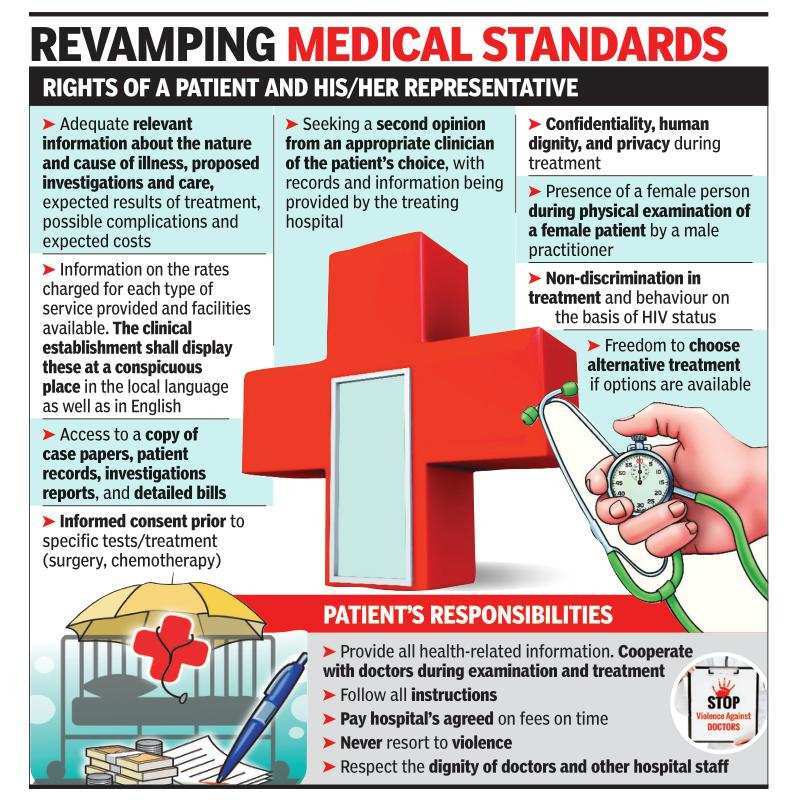Goa finally notifies rules to streamline medical services

Picture used for representational purpose only
PANAJI: After two years of enacting the Goa Clinical Establishment (Registration and Regulation) Act, the government on Monday finally notified the rules for its implementation. The rules broadly lay down minimum standards that registered clinical establishments in the state should maintain in terms of infrastructure and qualified manpower.
The old legislation – Goa Medical Practitioners’ Act – that was repealed after the new legislation came into force, lacked in many aspects.
Under the new rules, every clinical establishment requires to maintain certain minimum standards of facilities and services. The rules have also specified minimum personnel — doctors, paramedics and technical staff — that a registered unit will have to appoint. Trainee staff in nursing, paramedical and medical fields will not be considered as such.
A specialised service provider should at least have a registered medical practitioner of modern medicine — who has a minimum qualification of a post-graduate diploma or degree in a relevant discipline — to supervise, perform, and conduct tests or procedures. Such a practitioner should also be able to interpret and convey results.
Such a service provider should have a registered medical practitioner available on duty at each consultation room of the out-patient department (OPD) clinic during OPD hours to ensure the availability of services described in the mandatory display by the clinical establishment.
The in-patient department (IPD), should have two kinds of medical staff: Consultants and duty medical officers.
As soon as a patient arrives, he should immediately be attended to by a duty medical officer while a consultant should see him as soon as possible. If necessary, the duty medical officer may refer the patient to a suitable specialty consultant A trainee doctor should not be considered as the service provider.
There should be at least one duty medical officer to act as a resident medical officer in case of a maternity/nursing home and should be available round the clock. In the case of in-patient-based facilities with more than 30 beds, one duty medical officer should be available.
In addition, the number of consultants required in in-patient-based facilities should depend upon the type of services being provided: General, specialty or superspecialty.

A nursing home providing medical facilities should have a physician available on-call, round the clock. A nursing home providing surgical facilities should have a surgeon and an anaesthetist available on call.
In case emergency surgical facilities are also provided, then a surgeon and an anaesthetist should be available on-call, round the clock. The resuscitation of a newborn should be under the supervision of a trained registered medical practitioner, preferably a paediatrician. Maternity homes should have a gynaecologist/surgeon, anaesthetist and paediatrician.
Nursing staff must have a diploma or degree in nursing/midwifery from any recognised institution registered with the Goa Nursing Council. Currently, several private clinics and hospitals recruit nursing staff from Karnataka and Maharashtra.
It is also mandated that 70% of the nursing staff should have qualifications mentioned under the new rules, and that 30% should be trained staff, having passed at least Class X and having experience of working in a hospital for two years.
The rules are applicable to practitioners of alternative medicines such as ayurveda and homeopathy, too.
The old legislation – Goa Medical Practitioners’ Act – that was repealed after the new legislation came into force, lacked in many aspects.
Under the new rules, every clinical establishment requires to maintain certain minimum standards of facilities and services. The rules have also specified minimum personnel — doctors, paramedics and technical staff — that a registered unit will have to appoint. Trainee staff in nursing, paramedical and medical fields will not be considered as such.
A specialised service provider should at least have a registered medical practitioner of modern medicine — who has a minimum qualification of a post-graduate diploma or degree in a relevant discipline — to supervise, perform, and conduct tests or procedures. Such a practitioner should also be able to interpret and convey results.
Such a service provider should have a registered medical practitioner available on duty at each consultation room of the out-patient department (OPD) clinic during OPD hours to ensure the availability of services described in the mandatory display by the clinical establishment.
The in-patient department (IPD), should have two kinds of medical staff: Consultants and duty medical officers.
As soon as a patient arrives, he should immediately be attended to by a duty medical officer while a consultant should see him as soon as possible. If necessary, the duty medical officer may refer the patient to a suitable specialty consultant A trainee doctor should not be considered as the service provider.
There should be at least one duty medical officer to act as a resident medical officer in case of a maternity/nursing home and should be available round the clock. In the case of in-patient-based facilities with more than 30 beds, one duty medical officer should be available.
In addition, the number of consultants required in in-patient-based facilities should depend upon the type of services being provided: General, specialty or superspecialty.

A nursing home providing medical facilities should have a physician available on-call, round the clock. A nursing home providing surgical facilities should have a surgeon and an anaesthetist available on call.
In case emergency surgical facilities are also provided, then a surgeon and an anaesthetist should be available on-call, round the clock. The resuscitation of a newborn should be under the supervision of a trained registered medical practitioner, preferably a paediatrician. Maternity homes should have a gynaecologist/surgeon, anaesthetist and paediatrician.
Nursing staff must have a diploma or degree in nursing/midwifery from any recognised institution registered with the Goa Nursing Council. Currently, several private clinics and hospitals recruit nursing staff from Karnataka and Maharashtra.
It is also mandated that 70% of the nursing staff should have qualifications mentioned under the new rules, and that 30% should be trained staff, having passed at least Class X and having experience of working in a hospital for two years.
The rules are applicable to practitioners of alternative medicines such as ayurveda and homeopathy, too.
FacebookTwitterLinkedinEMail
Start a Conversation
end of article
Quick Links
Delhi Air PollutionDelhi TemperatureChennai WeatherBangalore TemperatureCovid vaccination centres in DelhiCoronavirus in DelhiRTPCR test in GurgaonHyderabad RainPollution level in BangaloreDelhi SmogDelhi TemperatureNoida AQIGurgaon AQI todayFire in MumbaiMumbai RainsCovid 19 RT PCR Test in NoidaDelhi AQI todaySrinagar encounter
